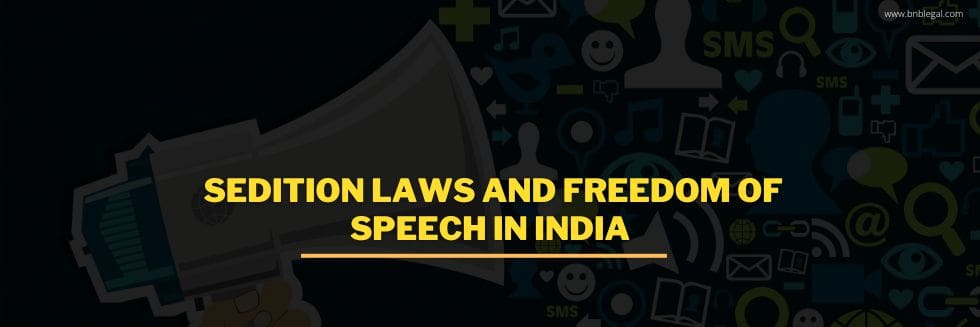Introduction
Sedition is defined as the act of instigating or encouraging, through speech, writing, or other expressive acts, violence, insurrection, or other forms of non-compliance against the authority of a government. It is categorized as a serious offence and is governed by the law.
Since each country’s government establishes its sedition laws, there might be differences in the precise definition and consequences of sedition. Sedition is a serious offence that carries serious penalties, including jail time and fines, in many nations. The goal of sedition laws is to safeguard a government’s stability and integrity by forbidding conduct that can inspire violence or pose a threat to the country’s security.
In many democratic nations, the freedom of speech and expression is a fundamental right. When it comes to speech that explicitly incites violence or poses a serious threat to public safety or national security, there are restrictions on this right. It might be difficult to distinguish protected speech and seditious speech.
Stained Relationship between Sedition and Freedom of Speech and Expression
According to Section 124A of the Indian Penal Code (IPC), sedition is a punishable offence in India. This clause states that anyone who seeks to incite hatred or contempt for the legally established government through spoken or written words, signs, or other visual expressions, shall be charged with sedition.
In India, sedition is punishable by a life sentence in jail, a fine, or both. The offence of sedition, however, should be enforced in situations when there is a clear encouragement to violence or public disorder, according to the Supreme Court of India. A person’s expression of dissent or simple criticism of the government does not always amount to sedition.
The scope and applicability of sedition laws in India have been a topic of contention over the years. Critics contend that the legal system is frequently abused to curtail the right to free speech and expression. In several cases, people have been accused of sedition for expressing their thoughts or criticizing the government for its policies, including activists, journalists, and students.
The Indian Supreme Court has laid out some rules to interpret the sedition legislation and limit its application. The court ruled in the 1962 case of Kedar Nath Singh v. State of Bihar that the sedition legislation should only be applied when there is an explicit threat to public order or incitement to violence. It became clear that no matter how strong, criticism of the government cannot be considered seditious until it leads to violence or public unrest.
However, worries regarding the misuse and abuse of the sedition law persist despite the established rules. The principles of freedom of speech and expression have been the subject of news stories calling for its abolition or significant revision in recent years.
However, Article 19(1)(a) of the Indian Constitution provides the right to freedom of speech and expression, subject to some justifiable limitations outlined in Article 19(2). These limitations cover India’s sovereignty and integrity, state security, diplomatic ties with other countries, and public morality and order. These limitations cover India’s sovereignty and integrity, state security, diplomatic ties with other countries, and public morality and order. However, there is room for argument over how these limitations should be interpreted and put into practice.
Disha Ravi ‘Toolkit’ Case
The legal lawsuit involving environmental activist Disha Ravi is known as the Disha Ravi Toolkit case. Disha Ravi was detained by the Delhi Police in February 2021 on suspicion of sharing and tampering with a “toolkit” relating to the ongoing farmer’s protest in India.
The “toolkit” was a document that climate activist Greta Thunberg posted on social media. To help the farmers protest against the new agricultural rules put in place by the Indian government, the toolkit supplied information and resources. The toolkit offers ideas for advocacy efforts on social media, hashtags, and other platforms.
Disha Ravi was detained for allegedly being one of the toolkit’s editors and was charged with sedition, criminal conspiracy, and inciting hatred among various groups under various sections of the Indian Penal Code. She was detained, igniting a heated debate about freedom of speech and the use of sedition laws in India.
Both domestically and internationally, the case attracted attention. Many critics claimed that Disha Ravi’s detention violated her right to freedom of speech and expression and that the charges against her were excessive. Disha Ravi’s supporters backed her because they saw her as an environmental activist who was using the farmer’s protest to exercise her right to free speech.
The Delhi High Court granted Disha Ravi bail in June 2021, noting that the prosecution’s evidence did not establish a case of sedition against her. According to the court, the Indian Constitution guarantees the right to peacefully oppose and demonstrate.
Vinod Dua v. Union of India
Vinod Dua, an Indian journalist and television host, was involved in a well-known judicial case known as Vinod Dua v. Union of India. Vinod Dua petitioned the Supreme Court of India to overturn an initial information report (FIR) that a local BJP leader in Himachal Pradesh had filed against him.
The BJP leader said in the FIR that Vinod Dua had made some defamatory remarks about Prime Minister Narendra Modi and the federal government in a YouTube video. Vinod Dua said that the FIR constituted harassment and was an attempt to repress his right to free speech and expression.
The case grabbed significant media attention and spurred discussions about India’s press freedom rules and their scope. Vinod Dua’s supporters contended that the case was a violation of journalistic independence and an attempt to silence dissenting voices.
Vinod Dua was given temporary protection by the Indian Supreme Court in June 2020, which ruled that no coercive measures should be taken against him about the FIR. The Supreme Court remarked that dissenting opinions are a crucial component of a healthy democracy and the court emphasized the significance of maintaining free speech and expression, particularly for journalists.
Conclusion
In India, the right to freedom of speech and expression is inalienable, and the sedition statute has generated considerable debate. In the Indian legal and social framework, finding a balance between the need to uphold public order and national security and the preservation of free speech remains a difficult task.
This article is written and submitted by Supriya Tiwari during her course of internship at B&B Associates LLP. Supriya is a 5th Year BBA LL.B. (Hons.) student at Amity Law School, Noida.






